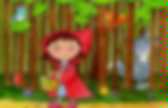

7444 13094 1 PB. La littératie médiatique multimodale: de nouvelles approches en lecture ... - Monique Lebrun, Nathalie Lacelle, Jean-François Boutin. La lecture sur l’internet rend-elle idiot? Pas si sûr! Les usagers du web lisent davantage mais sont plus dissipés et retiennent moins bien que les lecteurs déconnectés, selon des chercheurs néo-zélandais.
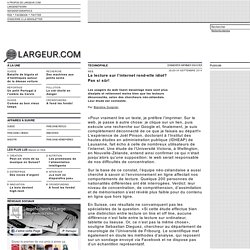
Leur étude est contestée. «Pour vraiment lire un texte, je préfère l’imprimer. Sur le web, je passe à autre chose: je clique sur un lien, puis exécute une recherche sur Google et, finalement, je suis complètement déconnecté de ce que je faisais au départ!» L’expérience de Joël Pinson, doctorant à l’Institut des hautes études en administration publique (IDHEAP) de Lausanne, fait écho à celle de nombreux utilisateurs de l’internet. Une étude de l’Université Victoria, à Wellington, en Nouvelle-Zélande, entend ainsi confirmer ce qui n’était jusqu’alors qu’une supposition: le web serait responsable de nos difficultés de concentration. 56863 tout ce que vous avez toujours voulu savoir sur les medias sociaux sans jamais oser le demander guide social media 2012. Recherche et fiabilité de l’information en ligne. Introduction.
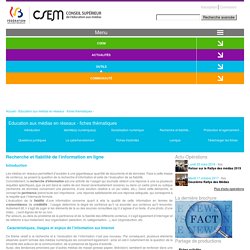
Journsm fr. 08synthese. Reading in a Whole New Way. ZAMUNER Emeline M2 RECH 2012 DUM. 64136 lecture sur ecrans et natifs numeriques quel positionnement pour les bibliotheques publiques. Les Français utilisent plus les réseaux sociaux que les Suisses. Publications. Publications. Translitteraties : le big bang de la lecture en ligne / E-dossier de l'audiovisuel : L'éducation aux cultures de l'information. Alan Liu est professeur au Département d’anglais de l’Université de Californie, Santa Barbara, où il enseigne depuis 1988.
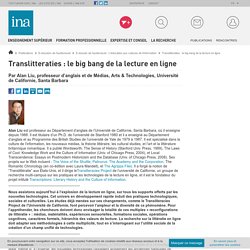
Il est titulaire d’un Ph.D. de l’université de Stanford 1980 et il a enseigné au Département d’anglais et au Programme des British Studies de l’université de Yale de 1979 à 1987. Lecture et technologies numériques - CRDP de Paris - Centre Régional de Documentation Pédagogique de Paris. Crdp.docpeda@ac-paris.fr Retrouvez dans cet article l’ensemble des ressources (documents empruntables à la médiathèque et ressources en ligne) qui vous ont été présentées le mercredi 27 mars 2013 dans le cadre de la conférence de Jean-François Rouet sur la lecture et les technologies numériques.
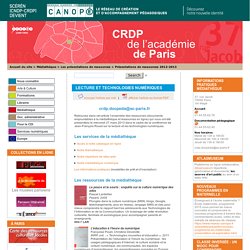
Les services de la médiathèque. 39438013. Littéracies (audiovisuelle, numérique, informationnelle, etc.) La littératie numérique est un concept récent dans notre société.
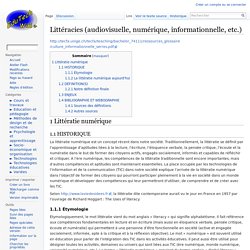
Digital Content Curation Is Career for Librarians. By John Farrier A cherpumple is a cherry pie, a pumpkin pie, and an apple pie each baked within separate cakes, then assembled and iced.

I found a picture of one on a food blog, posted it on Neatorama.com, and from there the cherpumple went viral. That one post brought hundreds of thousands of readers to Neatorama, and eventually the cherpumple was featured by mainstream news organizations such as ABC News. Sometimes all it takes is a librarian to shake the Web. Clay Shirky put it simply: “It’s not information overload. I have two jobs. Digital Content Curation Is Career for Librarians. 44411 numerisation et nouvelles pratiques de lecture. Nouvelles pratiques de lecture. Le 5 avril dernier, Médiadix organisait, avec le soutien de la Direction régionale des affaires culturelles (Drac) Ile-de-France, une journée de réflexion sur le thème « Nouvelles pratiques de lecture : de l’écrit à l’écran ».
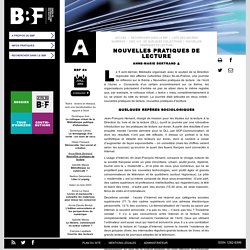
Mutation de l'animal lecteur : les nouvelles pratiques de lecture. On lit de moins en moins de livres… Mais l'homme pressé d'aujourd'hui, entouré d'écrans, n'a jamais autant lu !
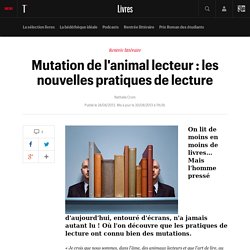
Où l'on découvre que les pratiques de lecture ont connu bien des mutations. « Je crois que nous sommes, dans l'âme, des animaux lecteurs et que l'art de lire, au sens le plus large, définit notre espèce », écrit Alberto Manguel, dans son Nouvel Eloge de la folie (éd. Actes Sud). La belle affirmation de l'écrivain argentin ne constitue-t-elle pas pourtant une profession de foi obsolète ? Faciliter la lecture d’informations sur le web.
Introduction Ecrire pour le web c'est d'abord écrire pour être lu à l'écran.
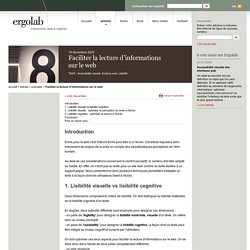
Robert Darnton e o futuro dos livros. Roger Chartier no 3º Congresso Internacional CBL do Livro Digital. CHARTIER. Digital Literacies: Knowledge, Skills and Attitudes for a Digital Age… Digital literacy for Glyndŵr University 170913. Social commentary. Tweets with replies by sheldon (@g_shel_w) Tweets with replies by sheldon (@g_shel_w) 420946. Le numérique vecteur d'un renouveau des pratiques de lecture : leurre ou opportunité ? CHARTIER. Imprima. Roger Chartier O francês Roger Chartier - é um dos mais reconhecidos historiadores da atualidade.
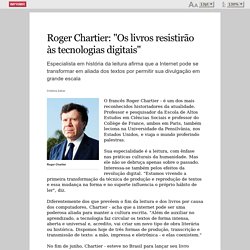
Professor e pesquisador da Escola de Altos Estudos em Ciências Sociais e professor do Collège de France, ambos em Paris, também leciona na Universidade da Pensilvânia, nos Estados Unidos, e viaja o mundo proferindo palestras. Sua especialidade é a leitura, com ênfase nas práticas culturais da humanidade. Mas ele não se debruça apenas sobre o passado. Interessa-se também pelos efeitos da revolução digital. Diferentemente dos que prevêem o fim da leitura e dos livros por causa dos computadores, Chartier - acha que a internet pode ser uma poderosa aliada para manter a cultura escrita.
No fim de junho, Chartier - esteve no Brasil para lançar seu livro Inscrever & Apagar, em que discute a preservação da memória e a efemeridade dos textos escritos. Como era, no passado, o contato das crianças e dos jovens com a leitura? Imprima. Roger Chartier: historiador francês, é professor do Collège de France e pesquisador da Escola de Altos Estudos em Ciências Sociais (EHESS, sigla em francês), ambos na França No decorrer da história, a sociedade viu o universo da escrita e dos livros mudar ao sopro da evolução e de muitos percalços.
Mas com certeza a mudança pela qual a área vem passando atualmente é uma das mais marcantes, senão a mais. Que o diga Roger Chartier, que se dedica ao estudo da história do livro e das práticas de leitura e investiga as consequências da revolução virtual - dentre elas, o analfabetismo digital - e como a forma do texto (em papel ou na tela do computador) afeta o sentido dele. Reading at a Crossroads. As our Readers Go Digital. As our Readers Go Digital Adrian Johns. Library 2.0, information and digital literacies in the light of the contradictory nature of Web 2.0. Tibor Koltay Department of Information and Library Studies, Szent István University, Jászberény & Department of Library and Information Science, University of West Hungary, Szombathely, Rákóczi út 53, Jászberény, Hungary. E-mail: koltay.tibor (at) abk.szie.hu Received September 24, 2010; Accepted December 12, 2010 Abstract.
a120. Impact of the Internet surfing on reading practices and choices. Fayaz Ahmad Loan Ph.D., Documentation Officer, Centre of Central Asian Studies, University of Kashmir, Srinagar (J&K), India. E-mail: fayazlib (at) yahoo.co.in Received March 5, 2012; Accepted June 5, 2012. Bleeker red. Home - Leitura Alimenta. DIGITAL IMMIGRANTS & DIGITAL NATIVES: The Digital Divide in Psychotherapy. The Digital Divide in Psychotherapy: At Home, School, in the Workplace and in... Life Clinical UpdateBy Zur Institute View a complete list of Clinical Updates. Have you encountered young clients who respond to texts during therapy sessions? Have you received a Facebook friend request from a client? From psychotherapy and counseling offices to homes, classrooms and the workplace, there is growing confusion, misunderstanding, disagreement and tension between Digital Immigrants (the older generations) and Digital Natives (the younger generations).
Grebert A. memoire. Bleeker red. Digital reading spaces: How expert readers handle books, the Web and electronic paper. Tableaux statistiques. Que valent les statistiques sur la lecture ? - Persée. Que valent les statistiques sur la lecture ? Conformément aux indications du C.E.S.P. — un journal est « lu » par plusieurs personnes, la proportion d'information non lue, non vue, dépasse probablement les 2/3, pouvant atteindre presque 90 % a. Quelles que soient les adaptations, les corrections concernant ces chiffres, il nous faut reconnaître un fait : en moyenne, la plus grande partie d'un organe de presse n'est jamais lue. Learning - Literacy. Has the written word surpassed its usefulness?
Marc Prensky thinks most books are too long, for starters. A 2007 study by the National Endowment for the Arts found three distinct trends: a historical decline in voluntary reading rates among teenagers and young adults a gradual worsening of reading skills among older teens declining proficiency in adult readers. The Book after the Book. Season for different forms of reading : Arts & Entertainment : News : The Hankyoreh. Why can’t we read anymore? Spending time with friends, or family, I often feel a soul-deep throb coming from that perfectly engineered wafer of stainless steel and glass and rare earth metals in my pocket. Touch me. Look at me. You might find something marvellous. This sickness is not limited to when I am trying to read, or once-in-a-lifetime events with my daughter.
The Reading Brain in the Digital Age: The Science of Paper versus Screens. In a viral YouTube video from October 2011 a one-year-old girl sweeps her fingers across an iPad's touchscreen, shuffling groups of icons. In the following scenes she appears to pinch, swipe and prod the pages of paper magazines as though they too were screens. When nothing happens, she pushes against her leg, confirming that her finger works just fine—or so a title card would have us believe. Naomi Baron's Words Onscreen: The Fate of Reading in a Digital World.
Readers have been dreading the rise of e-books since before the technology even existed. Don’t Be Misled about Paper Versus Electronic Books. Science Has Great News for People Who Read Actual Books. B today's soundbite-hungry media climate and the grueling slog that is a modern presidential campaign, candidates on the trail seldom break through the daily noise and strike a chord among the broader public. That's part of the reason why a video of New Jersey Gov. Chris Christie speaking in New Hampshire a couple of weeks ago was so remarkable. The video, shot by the Huffington Post, went viral, racking up more than 7 million views on Facebook. The six-minute-long clip shows Christie speaking forcefully about changing the way society treats drug addiction, an issue he has championed for years. It was a heartfelt, engaging and an artful effort at describing how policy reshapes people's lived experiences. Forbes Welcome. Your paper brain and your Kindle brain aren't the same thing.
Would you like paper or plasma? That's the question book lovers face now that e-reading has gone mainstream. And, as it turns out, our brains process digital reading very differently. Paper vs digital reading is an exhausted debate. The digital revolution is going into a decline, Tim Waterstone told the Oxford literary festival. Well, it's an attention-grabbing statement, ideally suited to our culture of assertive headlines, but it's probably not true.
That's not to say that the rapid growth of digital will necessarily continue, either, certainly not in markets that are already saturated with handheld devices. Why? Because the future is – as William Gibson told us quite a long time ago now – not evenly distributed. In fact, if one thing is ubiquitous these days it would seem to be liminality. Salon Numérique des bibliothèques vosgiennes : l'innovation en bibliothèque et ailleurs. Economie et Industries culturelles. Journal de l'Economie sur Walf TV. RELATÓRIO ETAPA QUALITATIVA by on Prezi. New literacies. New literacies generally refers to new forms of literacy made possible by digital technology developments, although new literacies do not necessarily have to involve use of digital technologies to be recognized as such. The term "new literacies" itself is relatively new within the field of literacy studies (the first documented mention of it in an academic article title dates to 1993 in a text by David Buckingham).[1] Its definition remains open, with new literacies being conceptualized in different ways by different groups of scholars.
For example, one group of scholars argues that literacy is now deictic, and see it as continually and rapidly changing as new technologies appear and new social practices for literacy emerge. WHAT WIKIPEDIA CAN TEACH US ABOUT THE NEW MEDIA LITERACIES (PART ONE) Belisle. Jean-françois gleyze. Nouveaux supports de lecture, Nouvelles pratiques informationnelles, … La curation de contenu : de nouvelles pratiques de lecture. Tarpin P. memoire complet. Grebert A. memoire.
Pratiques lecture. Livre numérique : un marché prometteur mais encore fragile. Nouvelles pratiques de lecture. Lecture (numérique) Prospective du Livre: De nouvelles formes d'oralités en milieux numériques ? Mutation de l'animal lecteur : les nouvelles pratiques de lecture. Salon Numérique des bibliothèques vosgiennes : l'innovation en bibliothèque et ailleurs.